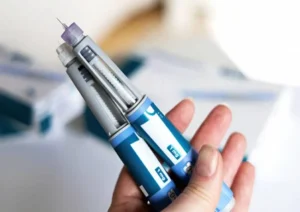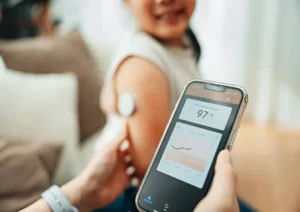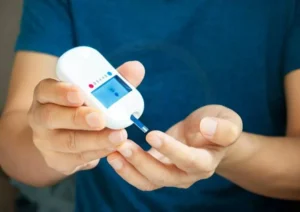Hidden Power of Insulin:
Why Your Body Depends on It

Insulin might sound like just another medical term, but this small hormone shapes every moment of your day.
Whether you’re enjoying a bowl of cereal, taking a brisk walk, or feeling that afternoon slump,
insulin is working behind the scenes to keep your body balanced.
Its name quickly comes up when talking about diabetes, but its reach goes far beyond that.
Understanding how insulin works not only helps prevent disease,
it arms you with knowledge to care for your overall well-being.
What is Insulin and How Does It Work?
Insulin acts as the body’s key to energy.
It helps sugar leave your blood and enter your cells where it’s used for power or stored for later.
This process keeps your blood sugar steady, letting you think, move, and feel your best.
The Discovery and Basic Definition of Insulin
Before insulin was uncovered, diabetes often meant a short and painful life.
In 1921, a Canadian team led by Frederick Banting and Charles Best changed the future for millions.
They extracted insulin from a dog’s pancreas and kept another dog with diabetes alive.
Their success led to the first human insulin treatment in 1922.
This discovery won the Nobel Prize in Physiology or Medicine just a year later, a rare and early honor in Nobel history.
Today we define insulin as a hormone made by the pancreas.
Its main role is to help control the amount of sugar in the bloodstream after eating.
Insulin Production in the Pancreas

The pancreas, found just behind your stomach, works like a traffic director for blood sugar.
Inside the pancreas are tiny clusters called the islets of Langerhans.
Beta cells inside these islets act like smart sensors, keeping watch over the body’s sugar levels all day.
When you eat and blood sugar rises, these beta cells pump out insulin.
When you fast or skip a meal, insulin release drops.
This push-pull keeps sugar levels from soaring too high or dipping too low.
Cellular Action: How Insulin Regulates Blood Sugar
Imagine insulin as a key, and each cell in your body as a locked door.
After you eat, sugar from your food travels into your bloodstream.
Cells need this sugar to make energy, but the door stays shut without insulin.
When insulin shows up, it unlocks the door and helps sugar move from the blood into the cell.
Cells use this sugar now or save it in the form of glycogen (a storable sugar) or fat for later.
Without enough insulin or if your cells start to ignore it, sugar piles up in your blood.
High blood sugar over time can damage nerves, kidneys, eyes, and more.
Insulin’s Role in Health and Disease
When insulin operates smoothly, your body keeps its energy steady and balanced.
But if something shifts, small changes can spiral into large health problems.
Maintaining Energy Balance and Metabolism
Insulin isn’t just about sugar;
it helps manage how you store and use food throughout your day.
* Stores Sugar: After a meal, insulin tells your liver, muscles, and fat cells to pull in sugar and store it for later.
* Builds Fat and Muscle: Insulin encourages the body to turn any extra sugar into fat, but also helps build and repair muscles.
* Controls How You Burn Food: When you’re fasting or active, low insulin helps release stored sugar and fat for fuel.

It’s like having a smart meter for your car’s gas tank.
Insulin helps decide when to fill up, when to coast, and when to switch to backup fuel.
What Happens When Insulin Goes Wrong: Diabetes and Insulin Resistance
Things get tricky if your body stops making enough insulin or your cells become less responsive to it.
Type 1 diabetes happens when your immune system attacks and destroys beta cells,
so little or no insulin is produced.
People with Type 1 diabetes need to replace insulin every day.
Type 2 diabetes starts when cells ignore insulin’s signal,
usually after years of overuse or stress (often linked to weight gain, inactivity, or genetics). The pancreas tries to keep up by making more insulin,
but eventually it can’t. This resistance leads to higher blood sugar and extra insulin floating around (hyperinsulinemia).
Over time, this can stress the heart, blood vessels, and even brain.
Common signs that insulin isn’t working right:
* Frequent thirst or hunger
* Needing to pee often
* Unexplained fatigue
* Slow-healing cuts
Early action helps prevent long-term damage.
Beyond Diabetes: Other Effects and Medical Uses of Insulin
Insulin also does other work that’s not as well known.
* It helps with cell growth and repair.
* Doctors use different types of insulin to treat metabolic disorders and stress states, not just diabetes.
* Research continues into how insulin may affect brain health and may play a role in conditions like Alzheimer’s disease.
In hospitals, insulin can help correct dangerously high blood sugar from infections, medicines, or organ problems.
It’s also used in people with severe insulin resistance, a condition sometimes linked to genetic or rare diseases.
Conclusion

Insulin is often seen as just another hormone, but its true power lies in the tightrope act it performs daily.
It smooths out blood sugar swings, fuels your cells, and powers you through work, play, and rest.
When insulin works well, you feel energized and focused.
If its balance tips, it can lead to serious health concerns, especially diabetes.
Staying aware of how your body uses insulin isn’t just for people with diabetes.
It matters for anyone who wants to age well and feel their best.
Make your food, activity, and health choices count for your hormones, and insulin will keep working for you.
Want to feel better, drop fatigue, and avoid health risks? Start with understanding insulin—the unsung hero inside us all.
HOSTINGER HOSTING PACKEGE DISCOUNT CODE
цветы флориста
живые цветы с доставкой
Way cool, some valid points! I appreciate you making this article available, the rest of the site is also high quality. Have a fun.
http://mcintoshchambers.com.au/includes/pages/1xbet_bonus_code_eingeben_2020.html
Зеркало трюмо Зеркала лофт – добавьте индустриальный шик в свой интерьер с нашими зеркалами в стиле лофт. Прочность и стиль в каждой детали.
Зеркала лофт Трюмо с подсветкой для спальни: создайте романтическую атмосферу.
El nГєcleo fundamental de AviaMasters es su mecГЎnica de vuelo dinГЎmico. A diferencia de otros crash games, aquГ no solo miras, sino que tambiГ©n experimentas la presiГіn constante de cada elecciГіn.
aviamasters.nom.es
https://wordsmith.social/larrybrown180/why-a-gas-fireplace-is-the-perfect-upgrade-for-your-home Gas fireplaces have come a long way in terms of efficiency and safety compared to earlier generations. During my research into different brands is that even within the same fuel type, heat distribution and control precision can vary a lot. Some brands prioritize advanced controls and customizable flame settings, while others are built around long-term reliability and simpler engineering. Being aware of these distinctions really helps when selecting a fireplace that fits both the house layout and regular usage patterns during the heating season.
скачать тикток мод на андроид бесплатно тик ток мод тг андроид скачать 2026
купить букеты цветов недорого с доставкой Быстро розы офис доставка
https://auto.qa/rent/car/
заказ цветов с доставкой недорого Цветы недорого быстро Москва
Новости России В Подмосковье раскрыта крупная сеть по производству и сбыту контрафактной алкогольной продукции. В ходе спецоперации изъято несколько тонн поддельного спиртного, а также оборудование для его изготовления. Возбуждено уголовное дело, ведется расследование.
Avia Masters de BGaming es un juego crash con RTP del 97% donde apuestas desde 0,10€ hasta 1.000€, controlas la velocidad de vuelo de un avion que recoge multiplicadores (hasta x250) mientras evita cohetes que reducen ganancias a la mitad, con el objetivo de aterrizar exitosamente en un portaaviones para cobrar el premio acumulado
https://share.google/HECqTrwgrqpkpzKxj
Avia Masters de BGaming es un juego crash con RTP del 97% donde apuestas desde 0,10€ hasta 1.000€, controlas la velocidad de vuelo de un avion que recoge multiplicadores (hasta x250) mientras evita cohetes que reducen ganancias a la mitad, con el objetivo de aterrizar exitosamente en un portaaviones para cobrar el premio acumulado
https://share.google/Dzi8Es9JxqHSw1yH8
Thank you for another excellent article. The place else may just anybody get that type of info in such an ideal means of writing? I’ve a presentation next week, and I am at the look for such info.
https://www.guestgeniushub.in/comment-reperer-un-site-frauduleux-iron-tv-pro-2/
Admiring the persistence you put into your site and detailed information you present. It’s nice to come across a blog every once in a while that isn’t the same outdated rehashed material. Excellent read! I’ve bookmarked your site and I’m adding your RSS feeds to my Google account.
регистрация RioBet
**mitolyn**
Mitolyn is a carefully developed, plant-based formula created to help support metabolic efficiency and encourage healthy, lasting weight management.
Wow that was strange. I just wrote an extremely long comment but after I clicked submit my comment didn’t appear. Grrrr… well I’m not writing all that over again. Anyways, just wanted to say wonderful blog!
byueuropaviagraonline
188betvietnam is something to behold. I can say it is quite awesome and nice. Checkout 188betvietnam now!
Нужен трафик и лиды? https://avigroup.pro/kazan/seo-optimizacziya-sajta/ SEO-оптимизация, продвижение сайтов и реклама в Яндекс Директ: приводим целевой трафик и заявки. Аудит, семантика, контент, техническое SEO, настройка и ведение рекламы. Работаем на результат — рост лидов, продаж и позиций.
188betthethao is my go-to for sports betting. Best odds around. Check it now here: 188betthethao
заказать дизайн квартиры студия дизайна интерьера
May I simply say what a comfort to find somebody who really knows what they’re discussing on the internet. You certainly understand how to bring a problem to light and make it important. More and more people need to check this out and understand this side of your story. I can’t believe you are not more popular given that you certainly possess the gift.
https://demos.appthemes.com/classipress/guide-atlas-pro-ibo-fonctionnalites-principales-et-avantages-de-lapp-iptv/
Downloaded the win88apps app the other day. Seems legit! The mobile experience is smooth, and I can play anywhere. Convenience is key, right? Give the app a shot: win88apps
Современная Стоматология в Воронеже лечение кариеса, протезирование, имплантация, профессиональная гигиена и эстетика улыбки. Квалифицированные специалисты, точная диагностика и забота о пациентах.
Quick shoutout to fly33. Found some seriously cool stuff here. The website’s clean, easy to navigate, and doesn’t bug out. Thumbs up from me.
Application mobile telecharger 1xbet burkina faso. Paris sportifs en ligne, football et tournois populaires, evenements en direct et statistiques. Presentation de l’application et de ses principales fonctionnalites.
La plateforme en ligne telecharger 1xbet burkina faso: paris sportifs en ligne, matchs de football, evenements en direct et statistiques. Description du service, marches disponibles, cotes et principales fonctionnalites du site.
Site web de pari foot rdc: paris sportifs, championnats de football, resultats des matchs et cotes. Informations detaillees sur la plateforme, les conditions d’utilisation, les fonctionnalites et les evenements sportifs disponibles.
Site web 1xbet rdc – paris sportifs en ligne sur le football et autres sports. Propose des paris en direct et a l’avance, des cotes, des resultats et des tournois. Description detaillee du service, des fonctionnalites du compte et de son utilisation au Congo.
La plateforme xbet burkina: paris sportifs en ligne, matchs de football, evenements en direct et statistiques. Description du service, marches disponibles, cotes et principales fonctionnalites du site.
High-quality resource marketplace accounts excitedly offer direct access to buy high-quality credentials for business. The main advantage of this platform lies in the availability of an extensive educational hub, containing secret strategies about traffic arbitrage. Inside the materials, we share hacks on using anti-detect browsers to boost efficiency in your daily work. Ordering from us, you get not only working goods, as well as helpful support, guarantees plus the best rates in the industry.
Выгодный маркетплейс по ссылке приветствует всех в своем каталоге цифровых товаров. Главная фишка этого шопа — заключается в наличии масштабной образовательной секции, где написаны свежие гайды по заливу. На сайте можно найти аккаунты Google, Twitter, Telegram под любые цели: начиная с авторегов до трастовыми профилями с историей. Заказывая у нас, клиент получает не просто куки, а также всестороннюю помощь саппорта, гарантию на вход и максимально адекватные цены на рынке.
Актуальная kraken onion ссылка публикуется в официальных телеграм каналах с PGP верификацией подписи администрации для подтверждения подлинности адреса маркета.
Защищенный доступ через онион кракен обеспечивает скрытие реального IP адреса на протокольном уровне благодаря распределенной сети Tor с тысячами независимых узлов маршрутизации.
Hi there very nice blog!! Man .. Excellent .. Superb .. I will bookmark your blog and take the feeds also? I’m happy to search out a lot of useful information right here within the post, we need develop more strategies on this regard, thanks for sharing. . . . . .
Brasilia prostitution
Delicious – here: http://www.glendenninggrainandsoil.com/markets/stocks.php?article=abnewswire-2025-12-4-the-ultimate-guide-to-buying-facebook-advertising-accounts-what-must-be-known
Uwielbiasz hazard? nv casino: rzetelne oceny kasyn, weryfikacja licencji oraz wybor bonusow i promocji dla nowych i powracajacych graczy. Szczegolowe recenzje, porownanie warunkow i rekomendacje dotyczace odpowiedzialnej gry.
Нужна работа в США? школа трак диспетчинга в сша в сша с гарантией результата : работа с заявками и рейсами, переговоры на английском, тайм-менеджмент и сервис. Подходит новичкам и тем, кто хочет выйти на рынок труда США и зарабатывать в долларах.
Специализированные каталоги помогают где найти рабочее кракен зеркало с индикаторами доступности в реальном времени и историей проверок работоспособности каждого адреса.
Recommended reading: https://aiotmining.com/10-best-sites-to-buy-facebook-accounts-pva-5/
Free video chat https://emerald-chat.app/ find people from all over the world in seconds. Anonymous, no registration or SMS required. A convenient alternative to Omegle: minimal settings, maximum live communication right in your browser, at home or on the go, without unnecessary ads.
Читать больше на сайте: https://medim-pro.ru/spravka-dlya-lagerya-kupit/
последние новости беларуси новости беларуси и мира
Официальные источники предоставляют рабочая кракен ссылка через подписанные сообщения на darknet каталогах с указанием даты последнего обновления и статуса работоспособности адресов.
самые свежие новости беларуси смотреть новости беларусь
bonus mostbet mostbet
казіно ігри онлайн ігри казино
онлайн слоти ігрові слоти
бонуси в казино бонуси казіно
Хочешь развлечься? купить альфа пвп федерация – это проводник в мир покупки запрещенных товаров, можно купить гашиш, купить мефедрон, купить кокаин, купить меф, купить экстази, купить альфа пвп, купить гаш в различных городах. Москва, Санкт-Петербург, Краснодар, Владивосток, Красноярск, Норильск, Екатеринбург, Мск, СПБ, Хабаровск, Новосибирск, Казань и еще 100+ городов.
1win сайт 1win официальный 1
ORBS Production https://filmproductioncortina.com is a full-service film, photo and video production company in Cortina d’Ampezzo and the Dolomites. We create commercials, branded content, sports and winter campaigns with local crew, alpine logistics, aerial/FPV filming and end-to-end production support across the Alps. Learn more at filmproductioncortina.com
Цікавлять бонуси? бонуси казіно: актуальні акції, подарунки за реєстрацію, депозитні та VIP-бонуси. Чесно розбираємо правила, допомагаємо зрозуміти вигоду та уникнути типових помилок під час гри.
Don’t miss it here: https://www.edudip.market/profile/npprtea-mshopz/5380858
квартира студия дизайн интерьера студия дизайна интерьеров отзывы
заказать дизайн интерьера спб современный дизайн интерьера
Соответствие стандартам обеспечено – для чего нужен перевод документов. Бюро переводов в Самаре. Документы любой сложности. Нотариальное заверение, срочно. Гарантия качества. Опыт.
Репутация безупречная – перевод документов на болгарский язык. Перевод доверенностей. Самарское бюро. Нотариальное заверение. Срочно и качественно. Юридическая точность. Конфиденциально.
https://t.me/Top_BestCasino/165
Официальный сайт Kraken https://kra44-cc.at безопасная платформа для анонимных операций в darknet. Полный доступ к рынку через актуальные зеркала и onion ссылки.
Официальный сайт Kraken https://kra44-cc.at безопасная платформа для анонимных операций в darknet. Полный доступ к рынку через актуальные зеркала и onion ссылки.
Полное сопровождение ВЭД позволило оптимизировать логистику и снизить издержки – https://vsoprovozhdenie.ru/
Теперь можем полностью сосредоточиться на бизнесе, доверив импорт профессионалам https://vsoprovozhdenie.ru/
Импорт под контролем, всё выполняется точно и в срок: ВЭД сопровождение импорта
Найкраще для вас: https://zastava.com.ua/kulinariia.html
Найцікавіше: https://homepage.com.ua/hroshi.html
Оформите займ https://zaimy-87.ru онлайн без визита в офис — быстро, безопасно и официально. Деньги на карту за несколько минут, круглосуточная обработка заявок, честные условия и поддержка клиентов 24/7.
Наши основные моменты: https://zebraschool.com.ua
Plateforme parifoot rdc : pronos fiables, comparateur de cotes multi-books, tendances du marche, cash-out, statistiques avancees. Depots via M-Pesa/Airtel Money, support francophone, retraits securises. Pariez avec moderation.
Оформите онлайн-займ https://zaimy-71.ru без визита в офис: достаточно паспорта, проверка за минуты. Выдача на карту, кошелёк или счёт. Прозрачный договор, напоминания о платеже, безопасность данных, акции для новых клиентов. Сравните предложения и выберите выгодно.
Paris sportifs avec 1xbet apk rdc : pre-match & live, statistiques, cash-out, builder de paris. Bonus d’inscription, programme fidelite, appli mobile. Depots via M-Pesa/Airtel Money. Informez-vous sur la reglementation. 18+, jouez avec moderation.
**mind vault**
Mind Vault is a premium cognitive support formula created for adults 45+. It’s thoughtfully designed to help maintain clear thinking